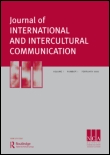
Journal of International and Intercultural Communication
Scope & Guideline
Illuminating Intercultural Connections
Introduction
Aims and Scopes
- Intercultural Communication Theory:
The journal provides a platform for the development and examination of theories related to intercultural communication, addressing how communication practices vary across different cultural settings. - Identity and Cultural Negotiation:
A significant focus is placed on how individuals negotiate their identities within multicultural environments, particularly in contexts of migration, diaspora, and globalization. - Social Justice and Equity:
The journal emphasizes themes of social justice, equity, and representation, exploring how communication practices can either reinforce or challenge systemic inequalities. - Methodological Diversity:
The journal encourages the use of diverse methodological approaches, including qualitative, quantitative, and mixed-methods research, to provide a comprehensive understanding of intercultural dynamics. - Cultural Resistance and Transformation:
Research often examines how cultural practices and communication serve as forms of resistance against oppressive structures, highlighting the role of communication in social change.
Trending and Emerging
- Decolonial Approaches:
Recent publications highlight the importance of decolonial perspectives in communication studies, examining how colonial histories shape current intercultural interactions and communication practices. - Digital Communication and Social Media:
The impact of digital platforms on intercultural communication is increasingly prominent, exploring how social media shapes identity, activism, and cultural exchange. - Racialization and Ethnic Identity:
There is a growing focus on the complexities of racialization and ethnic identity, particularly in the context of migration and diaspora, reflecting wider societal discussions on race and identity. - Health Communication in Multicultural Contexts:
Emerging studies on health communication address disparities and cultural factors affecting health outcomes, particularly in immigrant and marginalized communities. - Intersectionality in Communication:
The journal is increasingly exploring intersectional frameworks that consider how various social identities (e.g., race, gender, sexuality) intersect to influence communication practices and experiences.
Declining or Waning
- Traditional Cross-Cultural Comparisons:
There appears to be a decrease in studies that focus solely on traditional cross-cultural comparisons, as the journal leans more towards intersectional and nuanced discussions of identity and power dynamics. - Generalized Cultural Studies:
Research that broadly addresses cultural phenomena without specific intercultural communication implications seems to be waning, with a shift towards more targeted and relevant discussions. - Focus on Homogenous Cultural Groups:
There is a noticeable decline in papers that examine communication within homogeneous cultural groups, suggesting a growing emphasis on the complexities of multicultural interactions.
Similar Journals
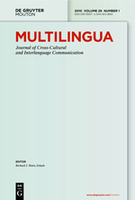
Multilingua-Journal of Cross-Cultural and Interlanguage Communication
Fostering Global Understanding Through Linguistic ResearchMultilingua: Journal of Cross-Cultural and Interlanguage Communication is a premier academic journal published by DE GRUYTER MOUTON, specializing in the dynamic fields of communication and linguistics. Established in 1982, this journal has significantly contributed to the discourse surrounding multilingualism, intercultural interactions, and language acquisition, with a notable reputation backed by an impressive Q1 ranking in both Communication and Linguistics and Language for 2023. Positioned strategically at the heart of Germany, the journal serves as a vital platform for researchers, professionals, and students alike, fostering scholarly exchange and insights into cross-cultural communication practices. With rankings placing it in the top percentiles across key categories in Scopus, including Arts and Humanities and Social Sciences, Multilingua exemplifies the highest standards of academic excellence. Although currently not an Open Access journal, it continues to provide a wealth of knowledge to the global research community.
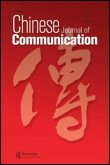
Chinese Journal of Communication
Fostering Scholarly Dialogue on Chinese Media and Global InteractionsThe Chinese Journal of Communication, published by Routledge Journals, Taylor & Francis Ltd, has established itself as a pivotal platform for scholarly discourse in the field of communication, particularly within the context of Chinese media and its global interactions. With a notable Q1 ranking in the 2023 Communication category and a commendable Scopus ranking of #77 out of 511 journals, it represents a significant contributor to the advancement of communication studies. The journal's focus extends from theoretical frameworks to empirical research, fostering a comprehensive understanding of the evolving communication landscape. Available in both print (ISSN: 1754-4750) and digital formats (E-ISSN: 1754-4769), the journal does not operate on an Open Access basis, yet it remains a highly sought-after resource for researchers, professionals, and students aiming to explore communication phenomena from a Chinese perspective. Given its publication history converging from 2010 to 2024, it serves as a valuable reference point for ongoing academic investigations and is instrumental in shaping future research directions in this dynamic field.
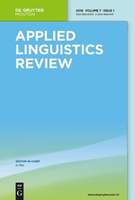
Applied Linguistics Review
Empowering dialogue in applied linguistics.Applied Linguistics Review is a leading academic journal published by WALTER DE GRUYTER GMBH, focusing on the dynamic field of linguistics and language studies. With an impressive Q1 quartile ranking in both Linguistics and Language and Social Sciences, the journal positions itself at the forefront of research, making it a crucial resource for scholars and professionals alike. The journal aims to foster scholarly dialogue by publishing high-quality, peer-reviewed articles that explore theoretical frameworks, empirical studies, and innovative methodologies in applied linguistics. Operating from Poland with an international reach, it is committed to advancing knowledge in areas such as language acquisition, language policy, and multilingualism. Its notable performance can be seen in its Scopus rankings, where it stands at #72 out of 1088 in the Arts and Humanities category and #86 out of 1167 in Social Sciences. The Applied Linguistics Review serves as an invaluable platform for researchers, educators, and students to disseminate and engage with cutting-edge research, thereby enhancing their understanding and application of linguistic principles in diverse contexts.

Bible Translator
Connecting Scholars, Translators, and Educators in Biblical StudiesThe Bible Translator is a distinguished journal dedicated to the scholarly exploration and analysis of biblical translations and their impact across cultures and traditions. Published by SAGE Publications Ltd, this journal seeks to bridge the gap between theology, linguistics, and intercultural communication, providing an essential platform for researchers, translators, and educators alike. With an ISSN of 2051-6770 and an E-ISSN of 2051-6789, it ensures broad accessibility to its readership. Although it currently does not operate under an Open Access model, the journal's rigorous peer-review process and commitment to high-quality research make it a vital resource for professionals and students in the fields of religious studies and translation theory. Contributing to the ongoing discourse around scriptural texts, The Bible Translator remains pivotal in fostering understanding and appreciation of the intricacies involved in translating sacred writings, thereby reinforcing its importance in both academic and applied contexts.

Cultura Lenguaje y Representacion-Revista de Estudios Culturales de la Universitat Jaume I
Advancing Critical Discourse in Cultural StudiesCultura Lenguaje y Representacion - Revista de Estudios Culturales de la Universitat Jaume I is a premier open-access journal dedicated to the exploration of cultural studies, linguistic discourse, and literary theory, published by the esteemed Universitat Jaume I. Since its inception in 2004, the journal has consistently aimed to provide a vibrant platform for interdisciplinary research and critical reflection within the fields of communication, literature, and cultural representation. With its impressive rankings in the Scopus database—placing in the 93rd percentile for Literature and Literary Theory and the 73rd percentile for Cultural Studies—this journal is recognized for its impactful contributions to academic discussions. Operated out of Castelló de la Plana, Spain, the publication not only welcomes contributions from seasoned scholars but also encourages emerging researchers to submit innovative works. By maintaining a dedication to accessibility and quality, Cultura Lenguaje y Representacion positions itself as an essential resource for scholars, practitioners, and students seeking to deepen their understanding of the intricate relationship between culture, language, and representation.

Culture and Dialogue
Connecting Ideas, Cultures, and DialoguesCulture and Dialogue is a prominent journal published by BRILL, dedicated to exploring the intricate relationships between culture, communication, and societal dynamics. With an ISSN of 2222-3282 and an E-ISSN of 2468-3949, this journal serves as a vital platform for disseminating research that bridges various academic disciplines, including cultural studies, anthropology, and communication theory. Positioned in the Netherlands, it benefits from BRILL's esteemed reputation in scholarly publishing, ensuring high visibility and accessibility within the academic community. The journal aims to foster a deeper understanding of cultural narratives and dialogues, highlighting their significance in contemporary society. As an invaluable resource for researchers, professionals, and students eager to engage with cutting-edge discussions, Culture and Dialogue contributes significantly to the advancement of knowledge in its field.

Jurnal Komunikasi-Malaysian Journal of Communication
Navigating the Evolving Landscape of CommunicationJurnal Komunikasi-Malaysian Journal of Communication is a premier, peer-reviewed journal published by the NATIONAL UNIVERSITY OF MALAYSIA, FACULTY OF SOCIAL SCIENCES & HUMANITIES. With an ISSN of 2289-151X and an E-ISSN of 2289-1528, this journal focuses on diverse aspects of communication theory and practice, particularly within the Malaysian context. As a significant contributor to the field, it has established itself with a respectable impact factor and currently holds a Q3 ranking in the Communication category per the 2023 Scopus Quartiles. The journal is dedicated to fostering scholarly discourse and advancing knowledge in communication studies, encompassing an array of topics from interpersonal communication to mass media impact. Since its inception, it has been committed to maintaining high academic standards while providing an engaging platform for researchers, professionals, and students. With converged years from 2014 to 2024, Jurnal Komunikasi continues to address emerging trends and challenges in communication, making it an invaluable resource for those seeking to deepen their understanding and engagement with the discipline.

deSignis
Bridging Disciplines: Where Semiotics Meets DesigndeSignis is a distinguished open-access journal published by the Federación Latinoamericana Semiotic, dedicated to advancing the field of semiotics and design. With its ISSN 1578-4223 and E-ISSN 2462-7259, deSignis serves as a crucial platform for researchers, practitioners, and students seeking to explore the intricate relationships between sign systems and design processes. Since its inception in 2004, this journal has fostered diverse scholarly discourse, contributing significantly to the understanding of visual culture, communication theories, and aesthetic practices. Its commitment to open access ensures that high-quality research is accessible to a global audience, promoting collaboration and innovation. Located in Paris, France, deSignis continues to be a vital resource for those interested in the interdisciplinary applications of semiotics in contemporary design.
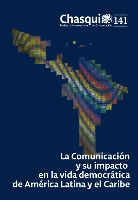
Chasqui-Revista Latinoamericana de Comunicacion
Advancing Knowledge, Bridging CulturesChasqui-Revista Latinoamericana de Comunicación is a distinguished academic journal dedicated to the field of communication in Latin America. Published by CENTRO INT ESTUDIOS SUPERIORES COMUNICACION AMER LATINA-CIESPAL, this journal has been an Open Access resource since 1972, promoting the dissemination of knowledge and fostering scholarly dialogue across diverse communication disciplines. With its ISSN of 1390-1079 and E-ISSN of 1390-924X, Chasqui invites researchers, professionals, and students to explore a wide range of topics, from media studies to intercultural communication, contributing to the understanding and advancement of communication practices in the region. The journal not only supports the growth of academic inquiry but also encourages the publication of innovative research that addresses contemporary issues faced in the communication landscape of Latin America. With its enduring commitment to accessibility and scholarly excellence, Chasqui serves as a vital platform for voices seeking to shape the future of communication studies.
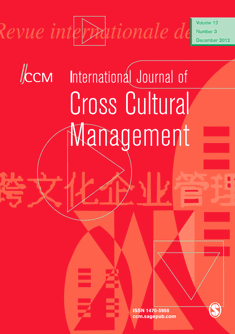
International Journal of Cross Cultural Management
Enhancing Management Through Cultural Understanding.International Journal of Cross Cultural Management, published by SAGE Publications Inc, is a premier academic journal dedicated to the exploration of cross-cultural management practices and their implications in today's globalized economy. With an ISSN of 1470-5958 and an E-ISSN of 1741-2838, this journal aims to foster interdisciplinary research that spans the fields of Arts and Humanities, Business and International Management, Cultural Studies, and Organizational Behavior and Human Resource Management. Remarkably, in 2023, it achieved Q1 rankings in Arts and Humanities and Cultural Studies, underscoring its critical role in shaping contemporary discourse within these domains. The journal publishes high-quality research that not only advances theoretical frameworks but also provides practical insights for professionals and organizations operating across diverse cultural landscapes. Although it is not an open-access journal, its rigorous peer-review process ensures that each article contributes meaningfully to the field. With a dedicated readership comprising researchers, industry leaders, and students, the International Journal of Cross Cultural Management is an essential resource for anyone interested in understanding the complexities and nuances of cultural interplay in management practices.